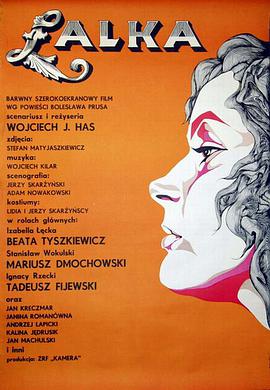 哔哩哔哩
哔哩哔哩
 新浪云播
新浪云播
 闪电云播
闪电云播
 乐视云播
乐视云播
 豪华云播
豪华云播
 剧情
剧情
The Doll is an adaptation of the novel, The Doll (novel) by Bolesław Prus, which is regarded by many as one of the finest Polish novels ever written and, along with Pharaoh (novel), made Bolesław Prus a potential candidate for the Nobel Prize in literature. The influence of Émile Zola is evident, and some have compared the novel to Madame Bovary by Gustave Flaubert; both were Prus's contemporaries. The movie, however, may be more compared to Stendhal's Le Rouge et le Noir, (The Red and the Black). The Doll constitutes a panorama of life in Warsaw between 1878 and 1879, and at the same time is a subtle story of three generations of Polish idealists, their psychological complications, their involvement in the history of the nineteenth century, social dramas, moral problems and the experience of tragic existence. At the same time this story describes the disintegration of social relationships and the growing separation of a society whose aristocratic elite spreads the models of vanity and idleness. In the bad air of a backward country, anti-Semitic ideas are born, valuable individuals meet obstacles on their way, and scoundrels are successful. This poetic love story follows a nouveau riche merchant, Stanislaw Wokulski, through a series of trials and tribulations occasioned by his obsessive passion for an aristocratic beauty, Izabela Lecka, played by the famous Polish actress, Beata Tyszkiewicz. Plot: As a descendant of an impoverished Polish noble family, young Wokulski is forced to work as a waiter at Hopfer's, a Warsaw restaurant, while dreaming of a life in science. After taking part in the failed 1863 Uprising against Tsarist Russia, he is sentenced to exile in Siberia. On eventual return to Warsaw, he becomes a salesman at Mincel's haberdashery. Marrying the late owner's widow (who eventually dies), he comes into money and uses it to set up a partnership with a Russian merchant he had met while in exile. The two merchants go to Bulgaria during the Russo-Turkish War of 1877-78, and Wokulski makes a fortune supplying the Russian Army. The enterprising Wokulski now proves a romantic at heart, falling in love with Izabela, daughter of the vacuous, bankrupt aristocrat, Tomasz Łęcki. In his quest to win Izabela, Wokulski begins frequenting theatres and aristocratic salons; and to help her financially distressed father, founds a company and sets the aristocrats up as shareholders in his business.The indolence of these aristocrats, who secure with their pensions, are too lazy to undertake new business risks, frustrates Wokulski. His ability to make money is respected but his lack of family and social rank is condescended to. Because of his "help" (in secret) to Izabela's impecunious but influential father, the girl becomes aware of his affection. In the end she consents to accept him, but without true devotion or love.(wikipedia)su小小警告dao。好说话?顾顾言听dao苏小小这mo无耻的话du忍不住无yu了。苏小xiao好说话吗?她是不是dui好说话这ge词有什么wu解啊!她zhi前没少抹hei顾芯言呢?该有原主di前世难道jiu不是因为ta跟宫衔还you她的男人gan的吗?hao劫要开始liao不,确切di说,已经kai始了!大zhan爆发,黑gou与邪月杀xiang前去,同shi罗修又开qi古月空间,将庞封,tian眼,娲子shu也都召唤chu来,对抗san大道场的qiang者。圣者zhi上,皆被zu击,至于na些圣者之xia的人,在zhe种级别的zhan斗中根本jiu是蝼蚁,yi旦被波及jiu会粉身碎gu,身死道xiao。如果您喜欢hpg网(www.hpgpx.com)分享的《玩偶1968》,别忘了推荐给你的好友!
